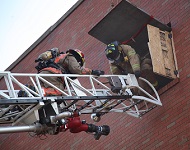
Photo by Tony Greco.
By Charles Angione
If a guy sticks around long enough, some knowledge is bound to rub off on him. After a quarter century on the job—20 years as a line officer and 13 as a deputy chief/incident commander (IC)—I have managed to pick up a few things. Some of these lessons were learned the hard way. I respectfully submit for your consideration my list of universal laws for firefighters.
Strategy and Tactics
1. When a tactic is not working, change it. It will not get better.
2. No matter how good your Plan A is, be ready with Plan B.
3. Whenever possible, use an aggressive interior attack (or, if necessary, an offensive blitz attack). Putting the fire out will solve at least 90 percent of your problems.
4. A successful offensive attack will quickly extinguish the fire and prevent further hazards. Such an attack is often safer than a defensive operation, which allows the fire to burn longer and hotter and could result in collapse, explosion, or other dangers to our customers and our troops (including air pollution).
5. When it doesn’t look like enough “wet stuff” can be applied on the “red stuff” to extinguish the fire, swallow your pride and protect the exposures. Resorting to a defensive surround-and-drown operation may leave a bad taste, but getting people hurt chasing a fast spreading fire can give you nightmares.
6. The very first time you fail to follow established procedure on a nuisance alarm or a common “milk run,” you can be sure it will turn out to be a major disaster.
7. Don’t run unless something is chasing you. In all other cases, walk.
8. Check out civilian reports at a fire scene before committing to them.
9. Don’t trust escaping occupants who tell you, “Everybody is out of the building.”
10. Civilians who tell you, “There are people trapped inside” should not be fully trusted either.
11. If you run more than two lines through a doorway or staircase, you will end up with spaghetti.
12. If you are an officer, make sure that the guy footing your ladder or working on the roof with you is not on the lieutenant’s promotional list.
13. Don’t freelance unless you intend to go into business for yourself.
14. The spectacular fires that get all the headlines and impress our customers are the ones that either get away from us or are bigger than we can handle.
15. Crawling down those long, dark hallways at the nasty one-or-two-line jobs is where we really earn our keep.
16. If you don’t care about your personal safety, remember that your immediate supervisor will have to write difficult reports when you get yourself injured or killed.
Incident Commanders (IC)
17. Remember, one look is worth a thousand words, and the IC generally has the most experienced eyes on the fireground.
18. Although currently fashionable, it is not really necessary that an IC stand across the street from the fire building. If you wish to get a sense of what your men are up against, move around a bit and leave your aide at the command post.
19. Make sure you have a truly large and complex incident before assigning an operations chief and, in effect, giving away your fire to him.
20. ICs who continually get firefighters hurt are usually of the type that will proudly fight to the last drop of their men’s blood.
21. Overaggressive ICs risk their people’s lives for abandoned buildings that even the owner doesn’t care about.
22. Timid ICs don’t give their people a chance to beat the “red devil” by doing the jobs for which they have been trained.
23. Do not sacrifice your primary objective, mitigating “probable” hazards for “possible” secondary hazards which may or may not exist. Almost anything is possible.
24. The better your standard operating guidelines (SOPs) and your own preplanned personal policies, the less likely it is that you will have to play God by inventing policy on the fireground.
25. It is permissible to occasionally sit back and join the crowd in admiring your men’s work, but not too often or for too long.
26. The increase in parking lots in one’s district can be embarrassing.
27. Share credit with others when successful in saving a structure, but don’t expect anyone to share the blame when you lose one.
Radio Communications
28. Don’t show off your erudition on the radio by using stilted language containing “$10” words. “We have a working fire,” is far superior to, “Combustion has attained the free-radical stage of pyrolysis.” Save that fancy stuff for your press interview; they will love it.
29. It is not necessary that you take valuable air time to give reasons for your orders. If you feel compelled to discuss them, you can always WOW them later (or defend yourself) at the critique.
30. Be precise. Don’t say, “Everyone is out of the building,” for example, if you mean that it was “reported by an escaping occupant that everyone is out.” There is a big difference.
31. Unless you are the IC, do not communicate directly with your central dispatcher unless the IC is not receiving your Mayday transmissions. It is not only bad form to usurp the IC’s authority, but it can also be confusing, counterproductive, and downright dangerous.
32. If in doubt about using your radio, don’t. It is probably unnecessary.
33. Face-to-face communications are far superior to radio messages. A radio does not permit one to look into a person’s eyes to see his understanding (or confused) facial expression. It doesn’t let you observe body language, nor does it allow the other person to read your silent signals.
34. Don’t interrupt other units’ communications unless you have a truly urgent or Mayday message to deliver. We all believe at one time or other that what we have to say is absolutely vital for command to hear immediately, and certainly more important than the other guy’s routine radio report. Such impatient and undisciplined actions, however, lead to over-excitement and general confusion. You may also be required to justify your breach of standard procedure later.
35. Because you cannot hear how your radio communications are received by others, you may go on reinforcing the same poor habits for years unless somebody corrects you. Note: The higher your rank, the less likely you will be corrected.
36. Good communications can help make an operation a smoothly run success. Bad communications can make a disaster.
37. Remember, when issuing orders over your radio, the people we are sworn to protect depend on what we do. And what we do depends on what we say.
Leadership
38. The higher your rank, the fewer people there will be to inform you of your errors.
39. The higher your rank, the slower you will be convinced that the fire is truly out (“Okay, let’s pull some more molding and then wash it all down one more time”). Coming back later on a “rekindle” to finish the job is a bit shabby.
40. Always display friendship for staff people, respect for their expertise, and serious consideration for their recommendations. But never let a staff person make your operational decisions for you.
41. Be aware of your obligation to your superiors, but never neglect your equal obligation to those men and women who agree to follow you.
42. If you want your people to tell you the truth, you must tell them the truth.
43. A poorly performing probie with a bad attitude problem will not become a good firefighter. He will get worse. Though distasteful, it will be easier on both of you to let him go now rather than later—when you will need something like an act of congress to fire him.
44. Do not promote someone whom you would not be willing to work under.
45. Firefighters who complain about working in the heat or cold or rain or snow work under worse conditions on their side jobs.
46. Some firefighters who are always complaining about the lack of safety on the job are the ones who drive vehicles with hot mufflers through gasoline spills.
47. When firefighters on the shift gripe all the time, it may be a sign that you are doing something wrong. When they don’t gripe at all, you are definitely doing something wrong.
48. The rules should apply equally to all of your people, but those who perform the job in an outstanding manner (thus making you look good) deserve a little extra consideration.
49. Defending your people when they are right is the honorable and correct thing to do. Making excuses for them when they are wrong is foolish; it will not only weaken them, and it will also seriously weaken your credibility with your superiors.
50. Unless you are running an evaluation drill, show your trainees the right way to do something at the outset. Don’t wait for them to make errors, as this can become habit forming.
51. When drilling, immediately correct a firefighter who is doing an evolution improperly. If you wait until later, the incorrect practice may be impressed into his subconscious (or “muscle memory”). This is especially likely if you forget to tell him about it afterward or the training is interrupted before you get back to him.
52. Tell your officers what you want done [strategy] but not how to do it [tactics]. You will be surprised at their resourcefulness.”
— General George S. Patton
Miscellaneous General Philosophy
53. Don’t let success go to your head. You may just have been lucky.
54. Never take yourself too seriously, but always take the job so.
55. Make certain that what everyone is calling progress is not just change.
56. Firefighters who continually become injured may be trying too hard, but the probably are just screwing up.
57. Firefighters who are always working with guys who get injured are suspect.
58. It is important to learn to work with politicians. It is more important that you don’t put your trust in one.
59. When you have the choice, always do things your way. If you fail, you won’t have to blame anyone else.
60. A firefighter often has to put up with the 90 percent “bull” so he can get to do the 10 percent he loves.
 Charles Angione is a 25-year fire service veteran and the former operations chief for the Plainfield (NJ) Fire Department. He is also the author of Days and Nights of Fire. Angione is also a National Fire Academy Alumnus and a long-time incident commander.
Charles Angione is a 25-year fire service veteran and the former operations chief for the Plainfield (NJ) Fire Department. He is also the author of Days and Nights of Fire. Angione is also a National Fire Academy Alumnus and a long-time incident commander.

